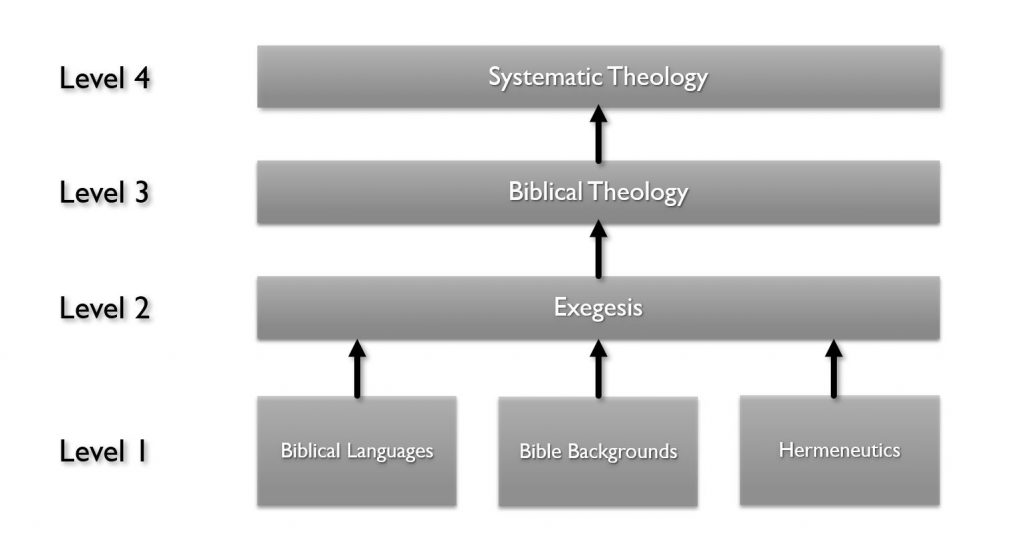Search Article
Structured Method of Scriptural Engagement in Biblical Doctrine, Truth & Theology
Contents
As a sequence of increasing levels of study, there are four tiers of learning development and theological understanding. For many decades, this model has existed to support a linear path of Bible students, pastors, theologians, and many in ministry. To serve as an outline and a way to learn each area of study. To be a resource to others and help the Church grow in the knowledge of Christ.
With this model of learning Biblical Studies, we move our way up as an approach to our advancement and more in-depth knowledge of theology. In contrast, we can arrive at correct conclusions without bad habits or wasted time. While we put effort and time into each subject area of interest, we expect to yield fruit or arrive at new levels to build upon.

These areas are segmented and partitioned to indicate what thinking and issues require our attention to defend or rely upon. To take a stand for the truth of God’s word, we will need a structured method of understanding and study.
Level 1 | Foundations
There is a hierarchy of subject matter relevant to topics of Biblical studies. Taken together, they are a group of subjects that serve as a foundation for further research concerning Scripture and associated issues. As a student advances further upward along with the four-level model, the supremacy of Scripture remains of utmost and pressing interest as it is the revered word of the LORD. This model is an ordered way of studying, understanding, and applying matters about God, His Church, His Word, and numerous additional doctrines.
Biblical Languages
Scripture is written in the languages of Greek, Hebrew, and Aramaic. From word definitions to grammar, punctuation, and phrases or sentences and their relationships to one another. The meaning of conjunctive terms gets attention as well. The organization of paragraphs, chapters, and books are areas of interest and analysis.
The functional activity and operation of literary context rely upon the language in use throughout an entire book or genre. Theoretical components of constructed meaning, such as verbs, nouns, adverbs, and adjectives, have a significant role in the use of biblical languages.
Bible Backgrounds
Background details concerning culture, geography, mannerisms, culture, etc. This area is the who, what, where, when, and why of Scripture. This area of study helps us to seek what was occurring at the time of events in Scripture. To recognize and study the purpose and rationale of why a book was written to coincide with proclaimed truth among their various authors. This is a support area of background for students to articulate what it is we believe and why. Examples include cultural factors, traditions, mannerisms, lifestyle, and so forth.
Hermeneutics
These are the principles of studying Scripture. To recognize and understand theoretical hermeneutics or how and why we know the rules of Scripture. Or separately to follow theological hermeneutics in how we understand connections between the text of Scripture, their applications, and how we draw inferences. Sound hermeneutics then include word studies, paragraph studies, to affect an overall theological framework.
So hermeneutics pertains to how we study scripture to form theological principles. Without unnecessary allegories, spiritualization, or logical fallacies while adhering to authorial intent by Scriptural genre.
Level 2 | Exegesis
The application of the three disciplines of biblical languages, biblical backgrounds, and hermeneutics together contribute to the study and practice of exegesis. This is the study of authorial intent within Scripture, where we see passages connect and allude to other passages. Connections that interface with Scripture can span vast areas of text. The scope of Scripture scales across themes and ideas that support one another in relevant and intentional ways between Old and New Testaments, or among covenants throughout history.
Biblical commentaries are often helpful with the practice of exegesis with the foundation of languages, backgrounds, and hermeneutical methods to support research or outcome-based learning.
More technically, this is the study of Scripture in original languages with a good hermeneutic with associated background information.
Level 3 | Biblical Theology
Biblical theology is the connectivity that extends from the discipline and practice of exegesis and further advances to an area of Biblical Theology as a third level of interest. This is an area of chronological study along a timeline of redemptive history. More specifically, as the events and truths of Scripture are traced over time. From the Patriarchs and covenants within both the Old and New Testaments to subjects or concerns beyond that. Biblical theology shows the progress of revelation and what God is doing at a given time from Genesis to Revelation.
Biblical theology informs our worldview, and it gives us the significance of our efforts. It is a theology that allows us to apply Scripture as God intends. Through Biblical Theology, the text of Scripture gives us specifics about how we ought to live. It pertains to the details. This is the depth of Scripture.
Level 4 | Systematic Theology
Chains or groupings of text come together into the larger or macro-level subject matter. As categories of Scripture, we see them as individual ideas that develop into details and interrelate with an over-arching message. This form of theology can include areas such as historical theology or counseling.
This is a systematic effort to go through the entire Bible and define what it teaches us about a topic or doctrine in an exhaustive way. This is the breadth of Scripture. The large topics of Scripture are covered as major doctrines such as the Word of God, Doctrine of God, Doctrine of Man, Doctrines of Christ and the Holy Spirit, Doctrine of Redemption, Doctrine of the Church, and Doctrine of the Future. These together are an expression of what the Bible says as a whole. Biblical Theology gives us the parts to assemble an overall and composite Systematic Theology concerning the whole counsel of God.
A method of ordered thought more suitable toward study, inquiry, and objections concerning Scriptural truth follows the four-tiered model of biblical studies introduced. Whereas biblical languages, bible backgrounds, and hermeneutics together support competent exegesis. Initially, as two levels of effort to understand Scripture in its original, literary, and historical context. From our exegetical efforts, we bring together interconnected text as a biblical theology to further build reasoned conclusions and assertions about what God’s word reveals. Combined texts and concepts demonstrated within Scripture then become assembled to form a systematic theology concerning various doctrines that emerge with a foundational and ordered method of support.
Active use of this model involves matching the right discipline with the questions that arise from concerns in life, or from people that have an interest in a subject area. So questions that become posed often get applied to another area in an approach to respond in a coherent way that fully satisfies questions with answers directly applicable to the matter at hand. In so doing, we maximize the likelihood of interpersonal confidence in the reliability of truth derived from the biblical text, biblical theology, and historical theology as originated from God’s revealed and inspired truth (2 Timothy 3:16).
For people who seek answers or challenge us for specific and reliable reasons for truth, it is not enough to rest upon a platitude that says, “the bible says it, and that settles it.” To borrow on the authority of God’s word in an opaque way doesn’t address the specifics in a detailed and articulate manner. Normally, this effort places our attention upon the level one category of biblical, historical, cultural, and interpretive understanding. While the authority of God’s word is unquestionably true and final, that does not necessarily get to questions of interest and resolve them. It is even better to get a clear understanding of what is otherwise left to confusion, exploitation, or personal economic gain.
As questions, concerns, or objections arise and become addressed, the Biblical Studies model here provides a way to step through each suitable and relevant area that matches our interests. It just isn’t responsive to make an end-run toward conclusions in the realm of systematic theology, or elsewhere. If along the way matching what we understand among biblical languages, biblical backgrounds, hermeneutics, and proper exegetical interpretation, there is a misunderstanding, confusion, or disagreement, then the overall view of the whole Bible comes into view in terms of the doctrine of inerrancy. Until finally, there is acceptance of the truth or willful rejection of God’s word and what it proclaims in terms of authorial intent.
As we match the right subject matter with pertinent questions, we assertively balance advocacy with inquiry to walk through an issue. To build a case in such a way where there is no room for misunderstanding and continued skepticism or Biblical illiteracy. So fluency in Biblical disciplines provides the certainty and confidence necessary for us to articulate the correct responses in areas that come about. Not as through successive approximation across Scripture, but by process of elimination among adjacent disciplines or categories of thought and persuasion. Applying effective use of this model provides a way to quickly get to the root of questions and beneath them to disprove presuppositions and together arrive at correct reasoning and truth.
It is one thing to enlighten people and bring them to recognize the truth. It is quite another that it should be accepted. Either way, we look to a principle as written by the Apostle Paul, “We destroy arguments and every lofty opinion raised against the knowledge of God, and take every thought captive to obey Christ” (2 Cor 10:5). Hopefully and prayerfully, people who are laden by the influence of culture and its darkness, become receptive, take courage and set aside selfish interests contrary to their well-being.















Comments are closed.